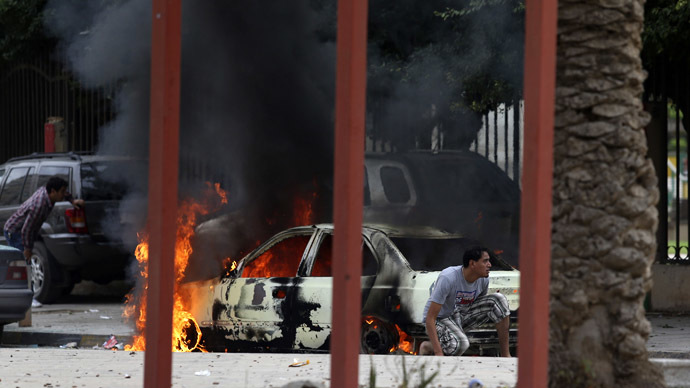Clashes between the Libyan army and Islamist militia have killed up to fourteen people and injured dozens in Benghazi, said the Libyan Ministry of Health. A state of alert has been declared in the city and people have been advised to stay in their homes.
Violence erupted early on Monday in Benghazi when the Libyan army
attempted to pursue a suspect into a neighborhood where militant
group Ansar al-Sharia is known to operate. The group in question
was blamed for the attack on the US Embassy in Benghazi last
September that killed Ambassador Chris Stevens.
"A violent clash has been taking place for several hours
between our forces and an Ansar al-Sharia cell," Colonel
Milud al-Zwei, spokesman for Libya's Special Forces, told AFP.
Zwei said Libyan law enforcement came under attack near
Ansar al-Sharia headquarters.
“The army retaliated, sparking clashes with all types of
weapons,” he said.
The Ansar Sharia HQ is burned down to the ground and now the neighborhood men are saying they're going to die before Ansar Sharia comeback.
— Bilal (@Bilalhb) November 25, 2013
The Libyan government has warned that a “red line” was not
to be crossed and soldiers have been ordered to report to
barracks across the city.
Libya is still struggling to control militia groups that
participated in the overthrow of Gaddafi in 2011.
On November 15, 46 people were killed in the Libyan capital when members of a militia group opened fire on peaceful protesters. The demonstrators were calling for militia groups to leave the city, chanting the slogan "We want an army, we want police." In response to the violence, Libyan Prime Minister Ali Zeidan urged all armed militias to leave the city of Tripoli following skirmishes between protesters and militiamen.

Violence in Libya stems from government’s inability to bring together various militia groups, editor at the Pan-African News Wire Abayomi Azikiwe told RT. "There has been a problem associated with brining together the various militia groups and many of them claim that they fought during the war regime change in 2011. But many of them are motivated by sectional interests, by criminal activity and we have seen the fruits of this over the last weeks both in the capital of Tripoli as well as in Benghazi," he said.
"In Benghazi the latest fighting indicates that there is strong resistance on the part of many of these militia groups into consolidating their forces inside what they claim to be the national army that the Prime Minister Ali Zeidan is working trying to construct during this time period."


